In 2018, Germany campaigned for a non-permanent seat on the Security Council for the period of 2019/2020 with a platform for conflict prevention and resolution amongst four other priorities. This article analyzes what happened to the German ‘Priority for Prevention’ during its 2019 membership on the Council and what lessons could be carried over to the final presidency month of July 2020.
Germany worked hard on defending multilateralism and on long-standing conflicts like Sudan and Libya, protecting the rule of law, as well as resolution 2467 on Women, Peace and Security, yet no concrete resolution or agenda item was achieved on prevention. The initial ‘Priority for Prevention’ was consequently transformed into a general leitmotif for 2020. However, presented with the 2020 ‘European Spring’ and the German twin presidencies of the EU and the Security Council in July, much could still be achieved to improve the Council’s working methods and tools to make it better suited to preserve peace and avert emerging crises.
Germany should continue to advocate for a comprehensive prevention approach in the Council, as well as for the establishment of a working group on prevention and a transparent and scientific mechanism for early warning that is consistently available to all its Members. Additionally, Germany should continue to empower the sharing of best practices on prevention by UN experts, as well as civil society briefers and national Responsibility to Protect focal points. Critical is also the continued empowerment of women and affected civil society representatives, to increase the body’s accountability to the civilians it intends to serve.
The German Priority for Prevention Agenda
“Prevention is, for us, an end in itself. It should never be seen as the instrument of any other political agenda. First and foremost, it saves lives and protects people from harm. But prevention also makes economic sense. The recent United Nations-World Bank study, Pathways for Peace, concluded that prevention would save some $34 billion in damage in countries that avoid war. These benefits are compounded over time to reach over $140 billion after 15 years.”
– UN Secretary-General Guterres
During the 22 May 2018 United Nations (UN) Security Council quarterly debate on civilian protection, the German Permanent Representative to the UN, Christoph Heusgen, emphasized the need to bridge the gap between words and actions: If Germany were elected to the Council, it would try to place conflict prevention very high on the Council’s agenda. Regarding the fate of Myanmar’s Rohingya Muslims, he said much of their suffering could have been prevented had the Council paid attention to that situation earlier. “We saw it coming,” he recalled, calling urgently upon the Government of Myanmar to start a structured dialogue with the Secretary-General’s Special Representative on Sexual Violence.
Indeed, Germany campaigned and won in June 2018 a non-permanent seat on the Security Council of the UN for the 2019/2020 period centered on (i) conflict resolution and conflict prevention amongst the four other priorities; (ii) climate change and security policy, (iii) Women, Peace and Security, (iiii) strengthening the system of international humanitarian law and (iv) disarmament.
After its election, Germany further emphasized the self-professed primacy of politics and “Priority for Prevention” for its 2019/2020 Security Council membership agenda. Additionally, the federal government proclaimed itself committed to further developing the UN and its specialized agencies’ crises and conflict prevention instruments, as part of the Sustaining Peace concept of the Security Council and the General Assembly, and by supporting the modernization and enhancing the efficiency of UN Peacekeeping.
Germany applies a comprehensive definition of prevention. It defines prevention as identifying and defusing conflicts before they flare up, with a clear emphasis on civilian instruments, whether it be mediation, dealing with the past, or humanitarian assistance. Germany emphasizes a close coordination of development, foreign, policy and security efforts to try to prevent crises and conflicts from erupting. Combat missions remain the last resort for the German government.
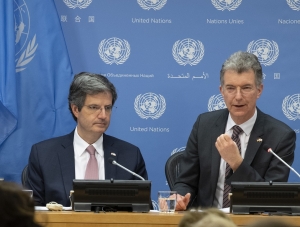
François Delattre (left), Permanent Representative of France to the United Nations and President of the Security Council for the month of March and Christoph Heusgen (right), Permanent Representative of Germany to the United Nations and President of the Security Council for the month of April, hold a joint press briefing on the upcoming programme of work for the Security Council. (Source: UN Photo #799601 )
Not surprisingly, the German foreign policy Priority for Prevention is coupled with an emphasis on the UN, as a critical component to the government’s long-standing commitment to multilateralism, as well as European integration. Germany conducted its first turn of the 2019 presidency of the Security Council, as a joint presidency with France (called Jumelage), a permanent member, during March and April of 2019 with the expressed hope that this coordination will be the means for making greater progress with respect to substantive issues before the Security Council and its working methods.
The role of women in conflict situations was the Jumelage’s shared priority, with a focus on women’s protection and their empowerment. The strengthening of humanitarian law was another shared goal in regard to protecting international humanitarian personnel. However, there was no longer an explicit mention of conflict resolution nor prevention for the shared presidencies. Given the lack of concrete agenda items for the initial conflict resolution and conflict prevention focus of the German presidency and lack of policy outcomes in terms of sponsored resolutions in the declared focus area, the Women, Peace and Security (WPS) policy initiative provides only an indirect effect on the initial prevention priority. 20 years ago, the Security Council resolution 1325 (2000) already highlighted the disproportionately severe impact of armed conflicts on women and linked gender equality to the maintenance of international peace and security.
In August 2019, Christoph Heusgen, stressed again the important role of the Security Council and wanted to ensure that the body gets involved when a crisis is still developing rather than when it has fully manifested itself, changing effectively the reactive nature of the body up to now.
In January 2020, while taking stock of its presidency, the German Foreign Minister Heiko Maas reemphasized that the Council should be more of a crisis prevention body than a crisis reaction panel. Therefore, Germany would double down on its prevention approach in the Council for the new year 2020. However, as Germany takes the presidency for a final turn in July 2020 not much has materialized out of the Priority for Prevention agenda.
What went wrong?
The proclaimed prevention priority is deeply connected to the German reason of state with a self-assigned duty to advocate for crisis prevention, conflict resolution and peacebuilding all over the world out of a moral obligation, as well as for the sake of Germany’s own interests. As a signatory of the General Assembly’s 2005 World Summit Outcome document, Germany developed its own national “Federal Government’s Guidelines on Preventing Crises, Resolving Conflicts, Building Peace”, which informs its foreign policy goals, is properly staffed and funded in the Foreign Ministry and hence there was no lack of national political backing from Berlin for the Security Council team.
Germany’s presidency of the Council started with the symbolic full opening of the Council meeting room’s curtains. Rather open and transparent was also the tone set by Representative Heusgen, deviating from the norm of endless prepared speeches for an open discussion in the Council, which was met with momentary goodwill.
During the first Jumelage presidency of the month of April, the programme of work for the Council highlighted several German efforts, especially with regard to the thematic sessions of the Council: The strengthening and promotion of the rule of law was debated in a briefing, followed by a briefing on non-proliferation on the 2nd of April, highlighting the importance of non-traditional threats to security. An open debate on the 11th of April discussed women in peacekeeping and another open debate on Women, Peace and Security was held on the 23rd of April with an emphasis on sexual violence in conflict.
However, the prevention agenda was met with little enthusiasm alongside a steady decline of human rights activism in the Council. The United States (US), the country with one of the most advanced national prevention frameworks and who had previously sent an expert on genocide prevention to the Council, with former Ambassador Samantha Power, has steadily retreated from multilateral efforts, treaties and institutions like the Human Rights Council under the America First doctrine. Just as Germany’s last membership in 2011/12 was overshadowed by strong disagreement with its traditional ally the US over the establishment of a no-fly zone over Libya, the increasing multitude of conflicts with US diplomats became apparent especially over the German WPS agenda.
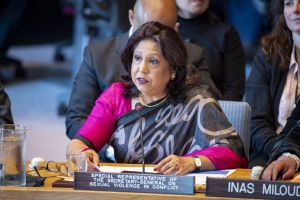
Pramila Patten, Special Representative of the Secretary-General on Sexual Violence in Conflict, addresses the Security Council meeting on women and peace and security, with a focus on sexual violence in conflict.
23 April 2019 (Source: UN Photo #805125)
Celebrating the 20 year anniversary of resolution 1325 (2000) a reinforced resolution on accountability, was supposed to be the crowning achievement of the German 2019 presidency. As the United Nations summarized the atmosphere in the Security Council situation in 2019, China, France, Russian Federation, United Kingdom and the United States – the Council’s five permanent members – found themselves particularly at odds over questions of State sovereignty, trading sporadic accusations of interference in domestic affairs. Alongside Russia and China, the US defended a narrow concept of security. The Trump administration advocated for an exclusion of reproductive and sexual rights from any resolutions or programs, hence rolling back previous achievements.
Despite the announced opposition to reproductive rights and abortion in particular, Germany co-chaired the Security Council Informal Experts Group on Women, Peace and Security, inviting the Libyan civil society representative Inas Miloud, alongside Denis Mukwege and Nadia Murad, who were jointly awarded the Nobel Peace Prize for their efforts to end the use of sexual violence as a weapon of war and armed conflict. The German initiative was actively supported at the highest level by Foreign Minister Maas and Minister of State Michelle Müntefering with a thematic focus on the rights of survivors of sexual violence. The German sponsored resolution 2467 passed on 23. April in 2019 with 13 of the 15 votes and two abstentions by Russia and China, with watered down language on reproductive rights.
In 2015, UN Women coordinated the Global Study on the Implementation of the United Nations Security Council resolution 1325, which already noted that the majority of the Security Council’s work on Women, Peace and Security has focused on protection of women and girls rather than prevention or effective participation.
Given the shortcomings of the highly anticipated resolution, Germany vowed to again focus on the issue of sexual violence in conflict during its July 2020 presidency. The goal is to institute accountability for the implementation of passed resolutions, as well as to continue to engage and empower female civil society representation in the Security Council, as well as at the German Foreign Office for the implementation of agenda 1325.
The WPS resolution represents the most concrete result of the German presidency in 2019. Yet, this most celebrated victory by the German Foreign Minister falls short on delivering comprehensively and systematically on the Priority for Prevention. There were and are no items on the programme of work for conflict prevention. Despite having dropped the Priority for Prevention as an outright agenda item, given the prescribed stalemates in the Security Council, rejection of an expansive security concept and the daily grind of addressing long standing conflicts like Afghanistan, the summary of Germany’s actions in the Security Council, like the WPS resolution that brings accountability to the perpetrators of sexual violence in conflict, have contributed to conflict prevention indirectly.
Germany’s positive impact on working methods
Despite the often-mentioned bureaucracy, gridlock and long standing agenda slots for discussions on continued crises such as Syria, Yemen and Libya, Germany successfully advocated for civil society briefings, also referred to as Arria-Formula-Meetings, by affected populations, such as women’s rights activists from Syria, to advance accountability in the Council. According to Representative Heusgen, April 2019 had the highest number of civilians briefing the Security Council to date.
Despite the lack of results on prevention, a critical benefit of a Germany’s membership in the Security Council was and is its willingness to cooperate and coordinate with other permanent and non-permanent members, like Sweden, who shares the emphasis on prevention. The German willingness to pass on lessons learned to upcoming fellow European members, such as Ireland that also advocate for a stronger prevention role of the Council, offers a strategic and long-term opportunity to advance the Council’s prevention capabilities. 2020 offers the unique diplomatic advantage of a “European Spring”, with fellow EU member states Belgium, Estonia, France and Germany all holding the SC presidency. Through the 2019 Jumelage, Germany has shown how the working methods of the Security Council can be enriched for the benefit of the Council and it continues to strengthen the institution and its capabilities, while it is increasingly under attack from within.
In the face of the Corona pandemic, the Council was unable to reach a call for a global cease fire until July 2020, mainly due to Chinese and American antagonism during the Covid-19 crisis, further highlighting the fault lines in the Council along a comprehensive security concept. The unprecedented opportunity of having the twin presidency of the Security Council and the EU Council in July 2020 should be capitalized upon to advance prevention holistically and strategically for the future, with as many allies as possible, given the stalemates in the Security Council and amongst the P5.
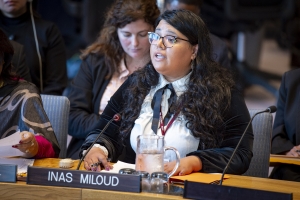
Inas Miloud, co-founder and chairperson of Tamazight Women’s Movement, addresses the Security Council meeting on women and peace and security, with a focus on sexual violence in conflict. (Source: UN Photo #805200)
Informal briefings like the Horizon-Scanning of potential conflicts with the Secretariat should be further institutionalized into a Working Group on Prevention. Establishing a systematic, constant and transparent Early Warning Mechanism for the Council, for example based on the Framework of Analysis for Atrocity Crimes by the Office on Genocide Prevention and the Responsibility to Protect, would be to the benefit of the Council’s role to preserve peace and avert emerging crises. Germany should not only advocate for consistency, but also increased diversity of Security Council briefings with a clear aim of bringing a gender expertise from UN and civilian conflict prevention experts, as well as to increase lessons learned and share good practices from for example national R2P focal points. Implementing resolution 2467, Germany should continue championing expert participation by female civil society representatives and affected communities, as women are again suffering disproportionally more from crises, like the current Covid-19 pandemic, further hindering an empowered role in prevention.
A more comprehensive and multilateral approach
In this 75th UN anniversary year, the German Foreign Office maintains its campaign for a reform of the Security Council, having also been one of the strong political and financial supporters of Secretary-General Guterres UN reforms over the last years for a more nimble, accountable and transparent organization. During its presidency, Germany increasingly found itself defending the rule based international order, including the legally binding nature of Security Council resolutions and their enforcement. In particular, the German Mission to the UN was vocal in its support of the International Criminal Court as “a lynchpins of our int’l justice system & a central institution in the fight against impunity”, against the most recent US Executive Order 11 attack on its staff. During the General Assembly high level meetings in fall 2019, Germany founded the Alliance for Multilateralism, an important proactive action to uphold the purposes and principles of the UN Charter of which international justice is an indispensable pillar.
Germany has also hinted at supporting the creation of a post in the Secretariat focused on climate change and security, while advocating for the recognition of climate change, as a major risk to peace and security for its July agenda. Additionally, Germany wants to put human rights related to peace operations on the agenda and place human rights at the heart of UN peace operations. Both would have positive impacts on conflict prevention, in terms of identifying conflict risks and strengthening human rights. Despite the lack of concrete results during its 2019 presidency, Germany vows that conflict prevention and resolution will be the leitmotif for Germany’s second Council Presidency. The leitmotif is justified by holding open debates on the above-mentioned subjects alone, examining the links between security and health, climate change or human rights. The shift in the German approach to prevention from a clear priority during its SC campaign and run up to its first presidency month to a general leitmotif in its final presidency month of July, is a noticeable decline.
China, Russia and nowadays the US are willing to defund human rights posts, as well as withhold annual membership payments (assessments), reflected by increasingly tense Fifth Committee budget negotiations and the so-called UN cash flow crisis of 2019, largely due to delayed payment of annual assessments by the US, amongst others. Last year has also shown the need to strengthen the protection of human rights defenders when they address the UN, with increasing online harassment of female UN diplomats, as well as visa issues for civil society organization representatives and simple UN building access challenges. These trends require Germany to robustly strengthen human rights funding and programmes, especially the often-overlooked maintenance and expansion of UN prevention capabilities. During 2020, Germany has the unique privilege of being an elected member of both the Human Rights Council, as well as the Security Council.
As Germany proclaimed in its federal prevention guidelines, “international engagement for crisis prevention, conflict resolution and peacebuilding is a lengthy and laborious task. However, perseverance and a long-term approach will pay off in the long run”. As we commemorate the 15th anniversary of the Responsibility to Protect, it is important that as a strong advocate for prevention, Germany keeps pushing against the decline of human rights inside the Council and for an expansive and comprehensive definition of security that focuses on civil society engagement and strengthening women’s role in all aspects of crises prevention.
Author: Anna-Marie Hetterich
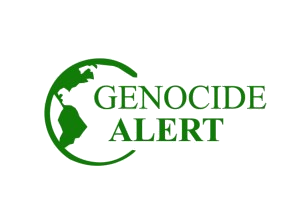
 Justitia, Quelle: AJEL/Pixabay Free for commercial use/No attribution required-License
Justitia, Quelle: AJEL/Pixabay Free for commercial use/No attribution required-License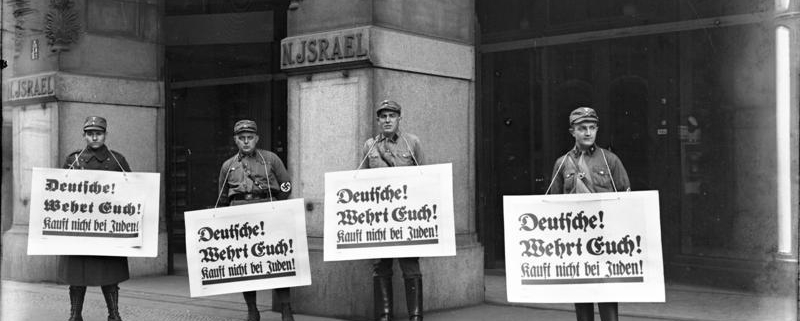 Wikimedia Commons/Bundesarchiv Bild 102-14469
Wikimedia Commons/Bundesarchiv Bild 102-14469
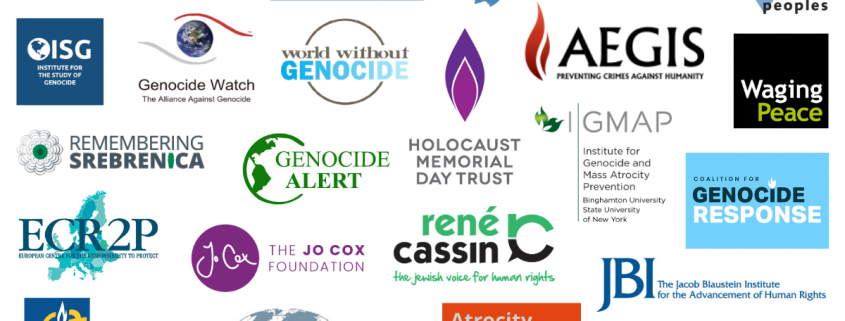
 Hailey Sadler: "Nobody's Listening Exhibition"
Hailey Sadler: "Nobody's Listening Exhibition"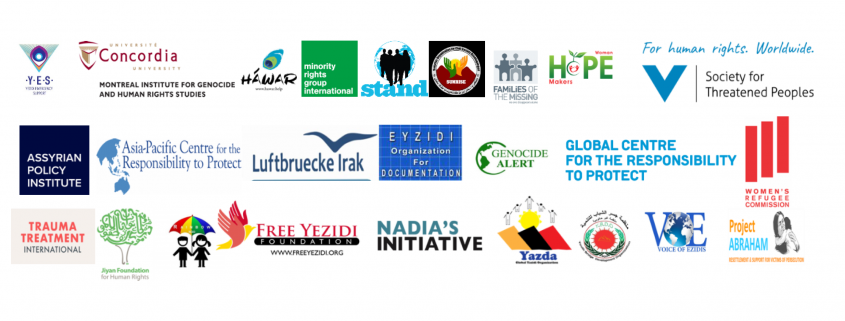
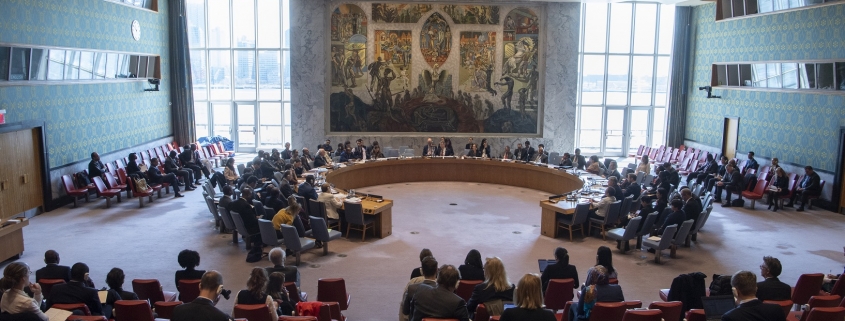 UN Photo #802898
UN Photo #802898


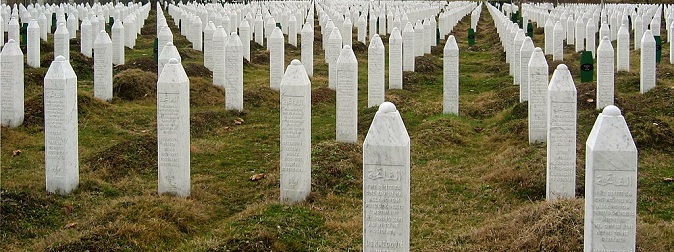 Wikimedia | Michael Büker
Wikimedia | Michael Büker
